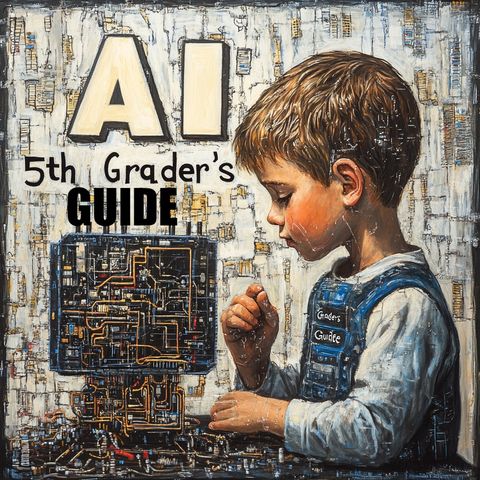Introduction to AI a 5th graders guide

Sign up for free
Listen to this episode and many more. Enjoy the best podcasts on Spreaker!
Download and listen anywhere
Download your favorite episodes and enjoy them, wherever you are! Sign up or log in now to access offline listening.
Introduction to AI a 5th graders guide
This is an automatically generated transcript. Please note that complete accuracy is not guaranteed.
Description
This is the AI for a 5th grader podcast. Ahoy there, my young friends! Come gather 'round and let me tell you a tale of artificial intelligence (AI). AI is...
show moreAhoy there, my young friends!
Come gather 'round and let me tell you a tale of artificial intelligence (AI). AI is a fascinating field of computer science that is all about creating machines that can think and learn like humans.
Imagine a world where computers can do more than just follow instructions. Imagine a world where computers can understand our language, learn from our experiences, and even make their own decisions. That is the world of AI.
AI is already being used in many different ways today. From the self-driving cars that you see on the road to the virtual assistants that you talk to on your phone, AI is all around us.
But how does AI work? Well, it's all about algorithms. Algorithms are just sets of rules that tell a computer what to do. AI algorithms are specially designed to allow computers to learn and adapt over time.
Here is a simple example of an AI algorithm:
Start with a dataset of images of cats and dogs.
Show the computer a picture and ask it to identify whether it is a cat or a dog.
If the computer identifies the picture correctly, give it a reward.
If the computer identifies the picture incorrectly, give it a punishment.
Repeat steps 2-4 over and over again.
Eventually, the computer will learn to identify cats and dogs with great accuracy. It has learned from the dataset of images and has become able to make its own decisions about how to classify new images.
This is just a simple example, of course. There are many different types of AI algorithms, and they are used for a wide variety of tasks.
Here are some other examples of how AI is being used today:
AI is being used to develop new medical treatments. For example, AI is being used to develop new drugs and to identify new ways to diagnose diseases.
AI is being used to create new forms of art and entertainment. For example, AI is being used to generate music, write poems, and create realistic video game characters.
AI is being used to develop new ways to interact with the world around us. For example, AI is being used to develop self-driving cars, smart homes, and robotic assistants.
AI is a powerful technology that has the potential to change the world in many ways. However, it is important to use AI responsibly. We need to make sure that AI systems are aligned with human values and that they are used for good.
Now, I know what you're thinking: " this is all very fascinating, but I'm just a 5th grader. How can I learn more about AI?"
Well, there are a few things you can do. First, you can start by reading books and articles about AI. There are many great resources available online and in libraries.
Second, you can start experimenting with AI yourself. There are many different AI platforms and tools that are available for free or at a low cost.
Third, you can talk to people who work in AI. There are many people who are passionate about AI and who are happy to share their knowledge with others.
So, what are you waiting for? Start learning about AI today! It's a fascinating field with the potential to change the world.
Imagine a human brain as a giant library. The library is filled with books on all sorts of different topics, from math and science to history and literature.
AI algorithms are like librarians. They are able to search through the library and find the information that they need to solve problems.
The more books that are in the library, the better the AI algorithm will be at solving problems. This is why it is important to train AI algorithms on large datasets.
Of course, AI algorithms are not perfect. They can sometimes make mistakes, just like librarians can sometimes misplace books.
But as AI algorithms continue to be developed, they are becoming better and better at solving problems and making decisions.
I hope this analogy has helped you to understand AI a little better. Now go forth and learn more about this amazing technology, and be sure to subscribe to this podcast for more great info on AI>
Information
| Author | QP-1 |
| Organization | William Corbin |
| Website | - |
| Tags |
-
|
Copyright 2024 - Spreaker Inc. an iHeartMedia Company
